Meet the winners of the Startup Challenge for photovoltaic cleaning 434k15
Four companies were chosen to carry out their pilot projects in the Startup Challenge: Photovoltaic cleaning. We chatted with them to find out a little more about the projects that led them to win this challenge, which was looking for waterless, sustainable and low-cost solutions to improve the cleaning process for solar s in large-scale photovoltaic projects.
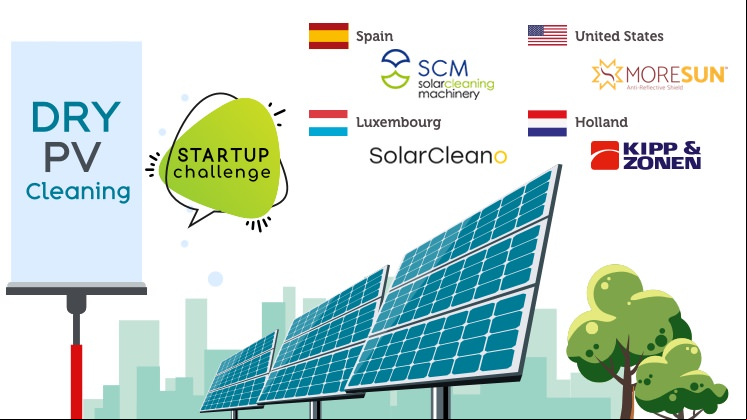
The winning startups were MoreSun (USA), developers of a family of optical anti-soil coatings; SCM (Spain), dedicated to the design and manufacture of cleaning robots for photovoltaic plants; SolarCleano (Luxembourg), which designs and makes solar cleaning robots, and Kipp & Zonen (Holland) — now veterans in the business — who supply instruments for measuring solar radiation and atmospheric properties in meteorology, climatology, hydrology, industry, renewable energy, agriculture and public health.
CLEANING ROBOTS 5np17
SCM and SolarCleano won this Challenge in the robots category (multi-row and single row respectively), with their -cleaning robots.
SCM External link, opens in new window. won with their Sahara model. "The system — its developers explain — consists of parts that are mechanical (gears, wheels, brushes, etc.), electronic (programmable operating system, end of row sensor system, etc.) and auxiliary".
External link, opens in new window. won with their Sahara model. "The system — its developers explain — consists of parts that are mechanical (gears, wheels, brushes, etc.), electronic (programmable operating system, end of row sensor system, etc.) and auxiliary".
What differentiates this system from others, they add, is its robustness, since it can stand the harsh environmental conditions endured by these types of installations and can clean dry or wet.
On the other hand, the strong point of the SolarCleano robot was its portability and the ability to control it remotely. "Most cleaners", say its creators, "work alone, so they need a robot that will be easy to lift, transport, manoeuvre and that they can handle from a safe position on the ground."
SolarCleano External link, opens in new window. stands out because "it can be unmounted [by a single operator], remote controlled and works on batteries". What's more, "with its four interchangeable and combined brushes, it adapts to the dirt of every installation".
External link, opens in new window. stands out because "it can be unmounted [by a single operator], remote controlled and works on batteries". What's more, "with its four interchangeable and combined brushes, it adapts to the dirt of every installation".
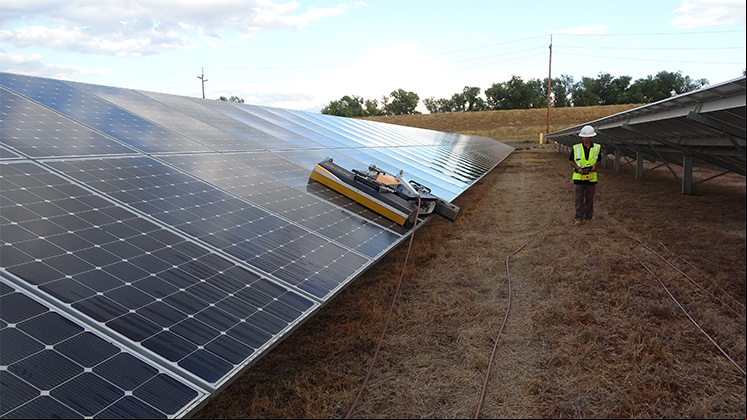
The SolarCleano robot is remote-controlled.
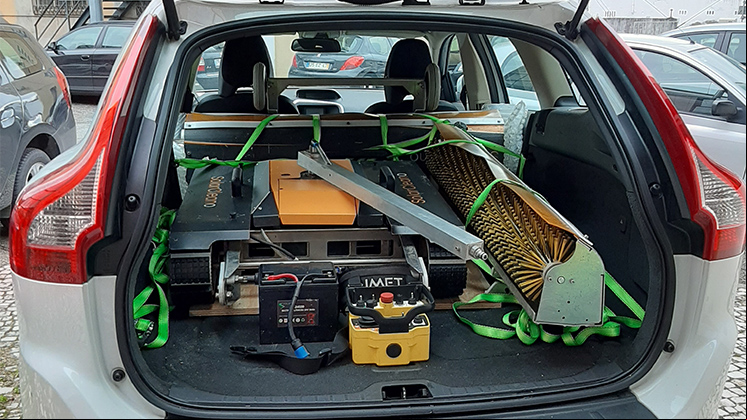
Dismantled, it will fit in any car.

SolarCleano's robot in action.

COATINGS AND SENSORS 6y1j5c
Pellucere Technologies won in the coatings category with MoreSun, a family of anti-reflective and anti-soiling coatings which can reduce soiling rates significantly on solar modules in hot dry environments, thereby increasing their energy efficiency. In addition, its application External link, opens in new window. makes it possible to reduce the reflectivity of the modules.
External link, opens in new window. makes it possible to reduce the reflectivity of the modules.
The designers tell us that "MoreSun External link, opens in new window. it is the result of more than a decade of development in Advanced Optical Coatings for the Energy and other Industries", and they are working with a number of OEMs for both solar glass and solar modules to be able to offer their product as a factory option.
External link, opens in new window. it is the result of more than a decade of development in Advanced Optical Coatings for the Energy and other Industries", and they are working with a number of OEMs for both solar glass and solar modules to be able to offer their product as a factory option.

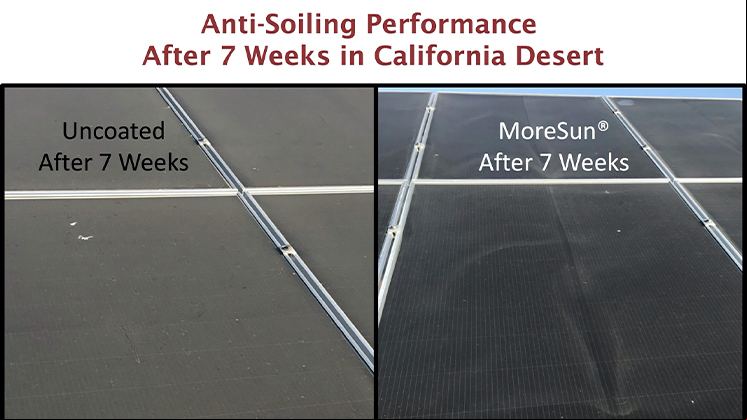
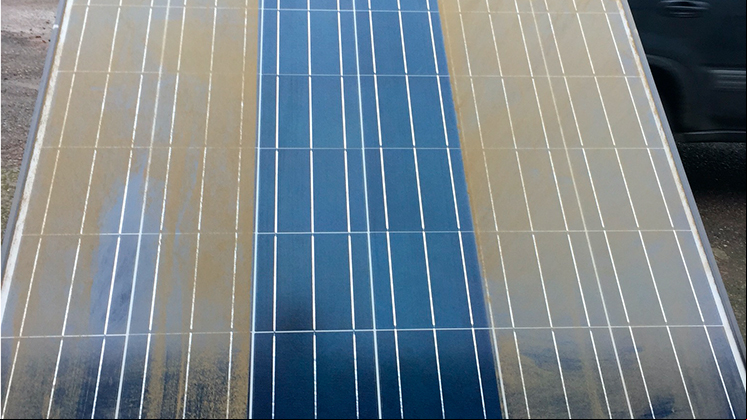
The most veteran is Kipp & Zonen, whose DustIQ sensor External link, opens in new window. can be installed in between actual PV models to measure the amount of soiling and calculate the energy lost due to soiling.
External link, opens in new window. can be installed in between actual PV models to measure the amount of soiling and calculate the energy lost due to soiling.
"Soiling is not only a challenge for our customers that own PV plants and need to produce maximum energy. It is also a challenge for the measurement of the incoming solar light", they explain. And this is important because "the incoming solar light is the starting point for the Performance Ratio calculations, an indicator on how well maintained and how efficient a PV plant is".
This is why, they say, while they were working on this problem, it seemed to them "it would make more sense to optically measure PV module soiling without the need for cleaning reference cells or s".
In addition, "since it has no moving parts and needs no cleaning it is fully maintenance free", according to its designers.


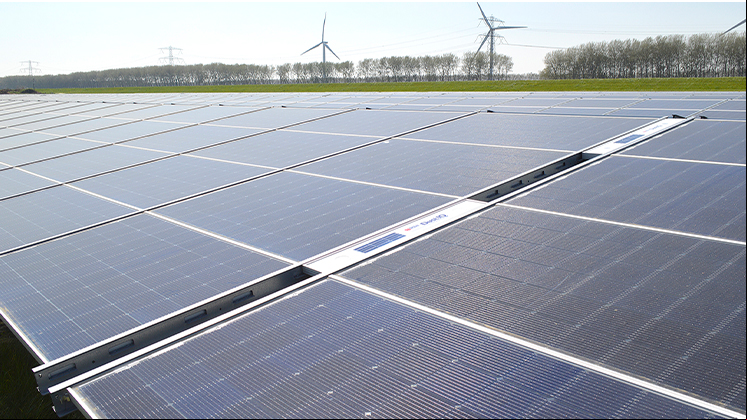
IBERDROLA, A BENCHMARK IN THE SECTOR 4bd6i
The four winning companies of the challenge agree on the importance of winning a contest like this one launched by Iberdrola, "a benchmark in the sector", with a portfolio of photovoltaic projects of over 30 GW, as it gives them the chance to try out their products and get media coverage from it.
"Being chosen throws new light on our activities and allows us to demonstrate the quality of our robots", says SolarCleano. "The mere mention of SolarCleano in an Iberdrola publication on LinkedIn has already raised interest from more people. The Startup Challenge will also allow us to draw on Iberdrola's know-how in the solar sector".
At MoreSun they also see this challenge as "an ideal opportunity to work with one of the world's most experienced renewable energy owners".
"In our case, we've clearly seen an impact from the media attention and have been able to carry out studies in the field, analyse new solutions, etc.", say SCM. "But, above all, Iberdrola will allow us to work together with them on their projects, so that, in the future, it will be taken into from the initial design phases".
HOW DO THEY SEE THE IMPLEMENTATION OF THEIR IDEAS IN THE PHOTOVOLTAIC INDUSTRY? 4i1p2x
Insofar as whether in the future they expect to see all photovoltaic plants equipped with their inventions, Kipp & Zonen are the most confident, convinced of the practicality of their sensor. Without doubt, they assure us, "we think so for all areas with soiling that generates energy losses greater than 2 %". "This excludes areas with a lot of rain", they continue "but includes all arid areas and places close to human activities that create dust, like day mining or composting facilities".
They have the same opinion at SolarCleano. "As it is already an emerging tendency", they say, "in the future no solar installation will be done without taking into the possibility of their cleaning. We aim at becoming the reference for this issue".
SCM are not so optimistic. "The problem we find is that there is a criteria difference within companies between the Construction department and the Operation and Maintenance department, which means that when it comes to plant design, although things are getting better, some essential elements for quick and efficient cleaning are still not being considered. At the moment we depend more on the type of plant than on the s themselves".
MORE INFORMATION ABOUT THE WINNERS i2u1c
The youngest of the startups chosen is Pellucere Technologies, the designers of MoreSun. Originally from Oregon State University, their launch product was the MoreSun Anti-Reflective Shield for the retrofit solar market in 2019. Currently they expect to launch of commercial versions of their next product line, which include the Field-Installed Anti-Soiling film that was evaluated during the start-up challenge, early in 2021. MoreSun now have installation projects underway in the US, Canada, , Italy and Spain.
SolarCleano built its first prototype in 2017 and presented it at the Intersolar tradeshow. Today they have over 10 staff and are present in more than 30 countries on four continents, and in with potential clients in many more.
SCM — the only Spanish company of the four — was founded in 2015 "with the aim of being able to solve the loss of efficiency in photovoltaic s". They currently have an engineering department, a workshop to produce their solutions and a site to test their equipment. Plus, they have started to offer a cleaning service for photovoltaic installations. Their equipment is working with their customers in Spain, Chile, El Salvador, Honduras, Mexico, Kuwait, Saudi Arabia, Egypt, Jordan, Australia, Japan, etc.
The oldest, by a considerable margin, is Kipp & Zonen, which was founded in 1830, although its entry into solar power was rather more recent. "About 15 years ago solar energy really took off and people were looking for good solar irradiation measurement solutions to check the efficiency of their PV plants. Being one of the few suppliers and with a long time and good reputation in the meteorological world people automatically turned to Kipp & Zonen". Kipp & Zonen operates the world over.




